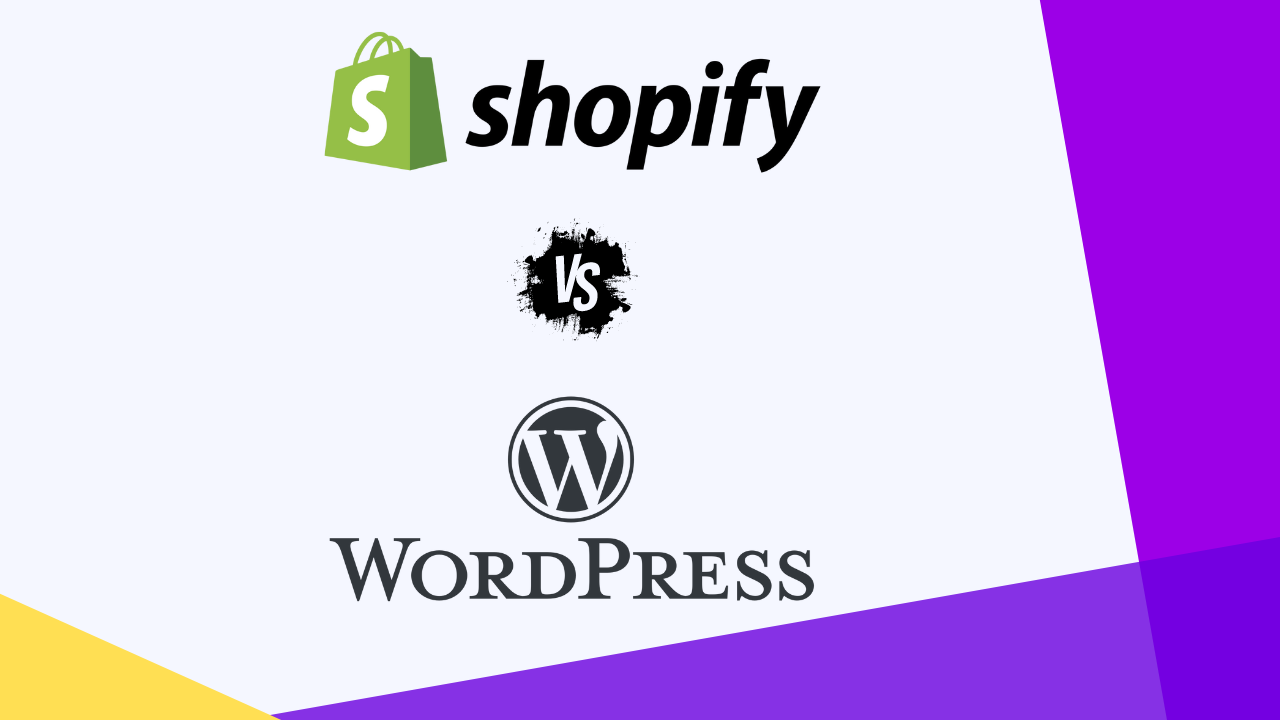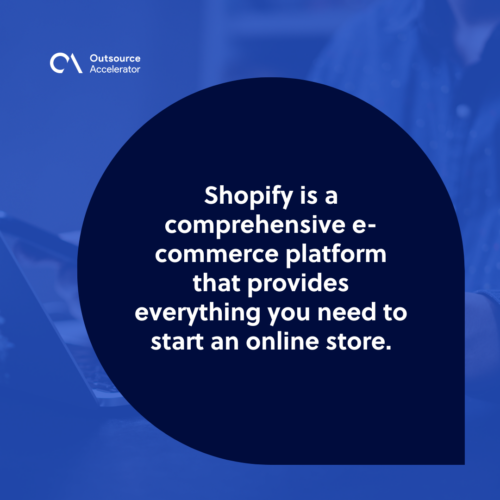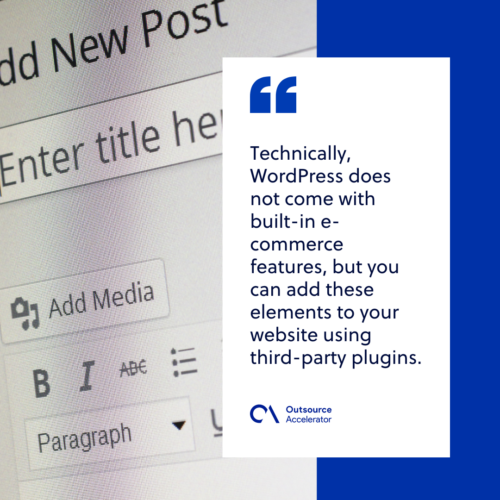Shopify vs. WordPress: Choosing the right e-commerce platform

When running an online business, selecting the right e-commerce platform is crucial. Especially if you’re inexperienced with website development.
Website builders have revolutionized how online businesses operate. They allow enterprises of all sizes to launch e-commerce sites with ease.
Shopify and WordPress are two popular options that offer distinct features and capabilities.
In this article, we will explore the differences between Shopify vs. WordPress. We’ll look at how they compare in terms of suitability, ease of use, tools and features, SEO performance, cost, and customer support.
Shopify vs. WordPress: What are the differences?
Before diving into the details, let’s understand the fundamental differences between Shopify vs. WordPress.
Shopify is a comprehensive e-commerce platform that provides everything you need to start an online store. It is a hosted solution, meaning you don’t need to worry about managing hosting or technical aspects.
On the other hand, WordPress is essentially a content management system (CMS). It offers plugins and extensions for e-commerce functions. It gives you more flexibility and control but requires additional setup and configuration.
When building an e-commerce website, these two often come into consideration. Both offer unique features and functionalities, catering to different needs and preferences.
Understanding the difference between Shopify vs. WordPress can help you make an informed decision based on your specific requirements.
How Shopify works
Shopify is renowned for its ease of use, making it an excellent choice for beginners. It offers a user-friendly interface and a wide range of ready-to-use templates. This makes setting up your online store hassle-free.
With Shopify, you can easily sell products, manage inventory, and process payments — all in one centralized dashboard.
According to Pagely, Shopify is one of the most popular e-commerce platforms, with a 20% market share.
Choose Shopify if:
- You prefer a hassle-free setup process with minimal technical knowledge required.
- You want a platform that takes care of hosting and security.
- You aim to quickly launch your store without spending much time on configuration and setup.
- You value convenience and ease of use over extensive customization options.
- You are looking for a platform that offers comprehensive customer support.
- You want to keep track of your business’ budget and finances.
How WordPress works
WordPress is popular for its versatility and flexibility. As a CMS, it allows you to create any website, including e-commerce stores.
This site has two versions: WordPress.com and WordPress.org. The former is mainly used for blogging, while the latter is self-hosted software.
When creating your online store, use WordPress.org.
With its vast library of themes and plugins, WordPress offers immense customization options. This lets you have control over your online store’s appearance and functionality.
Techjury reported WooCommerce, the site’s e-commerce plugin, has over 6.3 million active online stores.
Use WordPress if:
- You have specific design and functionality requirements.
- You desire complete control and customization options for your e-commerce website.
- You already have a WordPress-powered website and want to add e-commerce capabilities seamlessly.
- You possess intermediate to advanced technical skills and are comfortable managing hosting and software updates.
- You want access to a vast library of themes and plugins to enhance the functionality of your website.
- You are looking for a scalable platform that can grow alongside your business.

Shopify vs. WordPress: Pros and cons
Shopify vs. WordPress have their respective advantages and disadvantages you should consider.
Shopify pros
The benefits of using a Shopify platform are as follows:
- Easy setup and user-friendly interface
- All-in-one solution with built-in hosting, security, and payment gateways
- Extensive app store offering a wide range of add-ons and integrations
- Excellent customer support is available 24/7
- No need for extensive technical or coding knowledge
Shopify cons
On the other hand, Shopify’s drawbacks are:
- Limited customization options compared to WordPress
- Ongoing subscription fees can add up over time
- Unless you use Shopify Payments, there are transaction fees for using third-party payment gateways
- Reliance on its own infrastructure and updates
- Limited ability to handle complex product variations and options, especially for a large inventory
WordPress pros
WordPress offers the following advantages:
- Extensive customization capabilities with numerous themes and plugins
- Complete control over the website’s design and functionality
- WordPress’ editor, Gutenberg, has made it easier to use
- No transaction fees for using third-party payment gateways
- Has a lower total cost of ownership compared to Shopify
- There are many online resources, from user forums and professional developers
WordPress cons
At the same time, WordPress also has its set of cons, namely:
- Requires more technical knowledge, setup, and maintenance effort
- Relies on third-party plugins, leading to potential compatibility and security risks
- Limited customer support, primarily relying on community forums and documentation
- It can get expensive very quickly if website building is not thoroughly planned
- You will need to source your own web hosting, security, and domain name
Shopify vs. WordPress: How easy are they to use?
When it comes to ease of use between Shopify vs. WordPress, the former takes the lead. This is due to Shopify’s simplicity and user-friendly interface.
Its intuitive design allows users with little technical knowledge to quickly set up and launch their online store. The platform also provides easy-to-use tools for managing products, processing orders, and customizing the storefront.
In contrast, WordPress offers more flexibility but requires a steeper learning curve. The initial setup process may be slightly more involved. Though it provides extensive customization options with themes and plugins.
However, these added capabilities come with a trade-off of increased complexity and a higher level of technical expertise needed.
Shopify vs. WordPress: Tools and features
When building and managing an online store, the tools and features provided by the platform play a vital role in its success.
Let’s compare the tools and features of Shopify vs. WordPress:
Shopify e-commerce features
Shopify offers unlimited product listings regardless of your pricing plan. You have the flexibility to sell physical products as well as digital downloads.
It already includes all the essential marketing, shipping, inventory management, and analytics tools. Its app store also offers alternative or advanced versions of these tools for an extra cost.
Shopify provides a wide range of e-commerce features, including:
- Secure shopping cart and payment processing
- Abandoned cart recovery that notifies customers before they leave your store
- Inventory management and order tracking
- Mobile responsive themes for a seamless user experience
- Built-in marketing tools, including making your own discounts codes and promotions
- Integration with social media platforms and global marketplaces
- Robust analytics and reporting capabilities
WordPress e-commerce features
Technically, WordPress does not come with built-in e-commerce features, but you can add these elements to your website using third-party plugins.
Since many plugins are available, it’s hard to determine the specific features your website will have.
Let’s look at the features of two popular e-commerce plugins – WooCommerce and Ecwid. Here’s an idea of what you can expect from both:
- Customizable website design using themes and page builders
- SEO-friendly features and plugins
- Flexibility to extend the functionality with thousands of available plugins
- Versatile shopping cart options with WooCommerce
- WooCommerce provides a built-in blogging option
- Product reviews and ratings with WooCommerce
- WooCommerce can add product sorting and filtering capabilities
- Ecwid enables guest checkouts
- You can save or favorite products with Ecwid
- Ecwid offers a shipping calculator
- Ecwid provides multilingual translation options for your online store
In addition to the features mentioned above, it’s essential to consider the accessibility of your e-commerce website.
Ensuring that your site is ADA compliant is not only a legal requirement in many cases but also a way to make your online store accessible to a broader audience.
You can achieve ADA compliance by using WordPress ADA compliance plugins, which can help you enhance the accessibility of your website, making it easier for individuals with disabilities to navigate and use your online store.

Shopify vs. WordPress: SEO performance
Shopify vs. WordPress can both offer excellent SEO performance, provided that both are used and optimized correctly. Shopify offers built-in SEO features like:
- Customizable meta tags
- URL structures
- Mobile-responsive designs
- Automatic sitemaps
- Facilitates quick page load times
It simplifies the optimization of your online business for search engines.
WordPress, as a CMS, offers extensive SEO capabilities through plugins. It provides comprehensive SEO tools for:
- Optimizing on-page elements
- Generating XML sitemaps
- Managing website metadata
Additionally, its flexibility allows for more advanced SEO strategies if implemented correctly.
Shopify vs. WordPress: How much do they cost?
Cost is an essential factor to consider when choosing an e-commerce platform. Here’s how Shopify vs. WordPress compares costs:
Shopify operates on a subscription-based model that’s billed yearly. Here’s what Shopify’s plans currently look like in USD:
| Shopify plans and pricing (billed yearly) (as of July 2023) | |||
| Basic | Shopify | Advanced | Shopify Plus |
| $19/month | $49/month | $299/month | $2000/month |
Shopify also offers a three-day free trial. Additional costs include transaction fees for using third-party payment gateways and purchasing premium themes or plugins.
WordPress, as an open-source platform, gives you more control over costs. The software is free, but you need to consider expenses such as domain registration, hosting, premium themes, and plugins.
While WordPress provides plenty of free themes and plugins, premium options can range from $0 to $1000, depending on the functionality needed.

Shopify vs. WordPress: Customer help and support
Shopify vs. WordPress client care services vastly differ.
Shopify stands out in terms of its customer help and support. It offers 24/7 support through email, live chat, phone, and its onsite Help Center.
Businesses using the Shopify Plus plan can have their own merchant success manager for extra support and guidance.
WordPress, being a widely-used platform, has an active community of users and developers. It offers no direct support, but help can be found through forums and online communities.
Though it primarily relies on documentation and community-driven assistance, a wealth of information exists. So there’s little trouble finding answers to your concerns and queries.







 Independent
Independent




